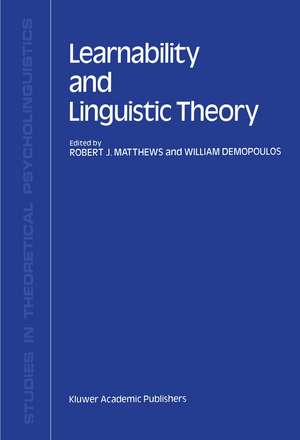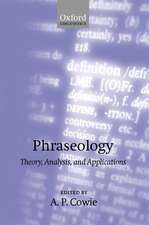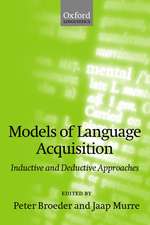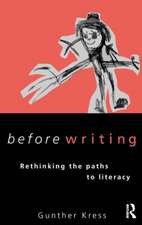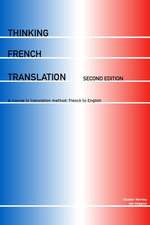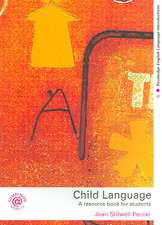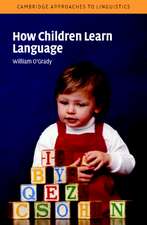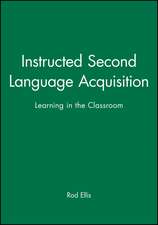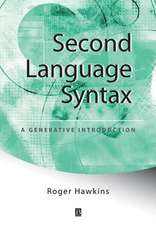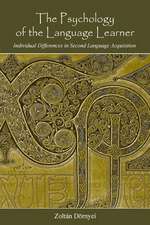Learnability and Linguistic Theory: Studies in Theoretical Psycholinguistics, cartea 9
Editat de R.J. Matthews, William Demopoulosen Limba Engleză Paperback – 30 noi 1989
Din seria Studies in Theoretical Psycholinguistics
- 18%
 Preț: 948.61 lei
Preț: 948.61 lei - 18%
 Preț: 1222.31 lei
Preț: 1222.31 lei - 15%
 Preț: 641.53 lei
Preț: 641.53 lei - 18%
 Preț: 947.50 lei
Preț: 947.50 lei - 15%
 Preț: 645.79 lei
Preț: 645.79 lei -
 Preț: 381.81 lei
Preț: 381.81 lei - 18%
 Preț: 2103.56 lei
Preț: 2103.56 lei -
 Preț: 383.83 lei
Preț: 383.83 lei - 15%
 Preț: 647.27 lei
Preț: 647.27 lei - 18%
 Preț: 951.77 lei
Preț: 951.77 lei - 15%
 Preț: 643.34 lei
Preț: 643.34 lei - 18%
 Preț: 948.61 lei
Preț: 948.61 lei - 20%
 Preț: 649.09 lei
Preț: 649.09 lei - 18%
 Preț: 956.99 lei
Preț: 956.99 lei -
 Preț: 381.98 lei
Preț: 381.98 lei - 15%
 Preț: 643.48 lei
Preț: 643.48 lei - 18%
 Preț: 952.72 lei
Preț: 952.72 lei - 15%
 Preț: 645.47 lei
Preț: 645.47 lei - 18%
 Preț: 1228.62 lei
Preț: 1228.62 lei - 15%
 Preț: 647.27 lei
Preț: 647.27 lei - 18%
 Preț: 945.47 lei
Preț: 945.47 lei - 18%
 Preț: 956.03 lei
Preț: 956.03 lei - 15%
 Preț: 642.03 lei
Preț: 642.03 lei -
 Preț: 391.61 lei
Preț: 391.61 lei - 20%
 Preț: 558.62 lei
Preț: 558.62 lei - 15%
 Preț: 639.73 lei
Preț: 639.73 lei - 18%
 Preț: 947.50 lei
Preț: 947.50 lei - 18%
 Preț: 958.25 lei
Preț: 958.25 lei
Preț: 360.97 lei
Nou
Puncte Express: 541
Preț estimativ în valută:
69.08€ • 72.03$ • 57.41£
69.08€ • 72.03$ • 57.41£
Carte tipărită la comandă
Livrare economică 17-24 martie
Preluare comenzi: 021 569.72.76
Specificații
ISBN-13: 9780792305583
ISBN-10: 0792305582
Pagini: 232
Ilustrații: 224 p.
Dimensiuni: 152 x 223 x 12 mm
Ediția:Softcover reprint of the original 1st ed. 1989
Editura: SPRINGER NETHERLANDS
Colecția Springer
Seria Studies in Theoretical Psycholinguistics
Locul publicării:Dordrecht, Netherlands
ISBN-10: 0792305582
Pagini: 232
Ilustrații: 224 p.
Dimensiuni: 152 x 223 x 12 mm
Ediția:Softcover reprint of the original 1st ed. 1989
Editura: SPRINGER NETHERLANDS
Colecția Springer
Seria Studies in Theoretical Psycholinguistics
Locul publicării:Dordrecht, Netherlands
Public țintă
ResearchCuprins
Introduction: Learnability and Linguistic Theory.- Learning Theory and Natural Language.- The Plausibility of Rationalism.- On Applying Learnability Theory to the Rationalism-Empiricism Controversy.- On Certain Substitutes for Negative Data.- Markedness and Language Development.- Learning the Periphery.- Some Problems in the Parametric Analysis of Learnability.- From Cognition to Thematic Roles: The Projection Principle as an Acquisition Mechanism.- List of Contributors.- Index of Names.- Index of Subjects.
Recenzii
`The relation of formal learnability theory to linguistic theory has been a lively and important area of investigation over the past decade, leading to significant insights into the `fundamental problem of linguistic theory' -- how a child comes to acquire a language on the basis of experience. The papers in this volume, from the leading researchers in this field, show the level of sophistication discussions of learnability theory have attained. An important volume for all linguists, psychologists and philosophers concerned with the issues generated for acquisition from our contemporary views of human language.'
Robert May, University of California, Irvine
`Learnability Theory is one of the most promising approaches to understanding the nature of learning that has appeared in recent years. This eclectic collection provides an excellent overview of the issues that have captured the interest of contemporary scholars in that field, and provides a convenient entry for cognitive scientists interested in the age-old question of how learning is possible, particularly from a philosophical and linguistic perspective.'
Zenon W. Pylyshyn, Professor of Psychology and Computer Science, and, Director, Centre for Cognitive Science, University of Western Ontario, London, Canada
Robert May, University of California, Irvine
`Learnability Theory is one of the most promising approaches to understanding the nature of learning that has appeared in recent years. This eclectic collection provides an excellent overview of the issues that have captured the interest of contemporary scholars in that field, and provides a convenient entry for cognitive scientists interested in the age-old question of how learning is possible, particularly from a philosophical and linguistic perspective.'
Zenon W. Pylyshyn, Professor of Psychology and Computer Science, and, Director, Centre for Cognitive Science, University of Western Ontario, London, Canada
